Ever wondered what language is spoken in Belgium? Nestled in the heart of Western Europe, Belgium captivates visitors with its medieval architecture, delectable chocolates, and vibrant cultural tapestry. Belgium has three official languages: Dutch, French, and German. Thus, Belgium is a trilingual nation. In this article, we explore the fascinating world of languages spoken in Belgium. Discover Dutch, French, and German, and how Belgium’s multilingual identity shapes its culture.
Belgium: A Trilingual Nation
Belgium thrives on a beautiful trilingual identity. Let’s delve into each one of the three official languages spoken in Belgium:
- Dutch: Reigning supreme in the north, Dutch (also known as Flemish) is the official language of the Flemish Region. While closely related to standard Dutch spoken in the Netherlands, Flemish boasts its own unique quirks in pronunciation and vocabulary.
- French: The language of elegance and diplomacy, French holds cultural significance in Belgium. It’s the official language of Wallonia, the southern region, and plays a vital role in Brussels, the bilingual capital city.
- German: A touch of Germanic influence graces the east of Belgium. The German-speaking Community, bordering Germany, uses a variant of High German as their official language.
Understanding & Living Multilingualism in Belgium
This intriguing linguistic landscape is a product of Belgium’s rich tapestry. Dutch reflects the Germanic roots of the majority population in Flanders. French influence stems from historical ties with France and its past role as the language of the elite. The presence of German in the east is a nod to geographical proximity.
Belgium embraces its multilingual identity. All three languages hold equal status at the federal level, ensuring inclusivity and respect for cultural diversity. The educational system fosters language learning, making many Belgians proficient in two or even all three languages.
Understanding Belgium’s languages goes beyond memorizing a few phrases. It’s about appreciating the historical and cultural forces that shaped this unique nation. So, on your next visit to Belgium, take a moment to listen to the symphony of languages and immerse yourself in the rich tapestry of communication that defines this charming country.
The Challenge of Becoming Multilingual
More than half of the people around the world know two languages or more. Our minds can definitely learn two languages at once because as human beings, we are wired to pick up new languages. We have already adopted our native language by passively absorbing phonetics, listening, and interacting with others after birth. Ultimately, this leads to associating a variety of words with meaning.
Learning a new language can be compared to going through a jungle with a large knife and carving your path.
To learn languages, many people use Anki, which is a powerful flashcard app. Anki uses spaced repetition to help learners remember information more effectively.
To use Anki to learn any language, you can create flashcards that contain vocabulary and grammar concepts. Alternatively, you can use the premade French Anki Decks by ADROS VERSE EDUCATION to learn and practice the French languages. Anki will then show you the flashcards at spaced intervals, helping you to learn and retain the information.



